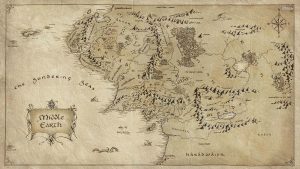
 Villany Unveiled
Villany Unveiled
A gala ball: The York family celebrate their reascent to power; the Wars of the Roses (named for the feuding houses’ heraldic badges: Lancaster’s red and York’s white rose) are almost over. Actually, the year is 1471, but for present purposes, we’re in the 1930s. A singer (Stacey Kent) delivers a swinging “Come live with me and be my love.” Richard of Gloucester (Sir Ian McKellen), the reinstated sickly King Edward IV’s (John Wood’s) youngest brother, moves through the crowd; observing, watching his second brother George, Duke of Clarence (Nigel Hawthorne) being quietly led off by Tower warden Brackenbury (Donald Sumpter) and his subalterns. With Clarence gone, Richard seizes the microphone, its discordant screech cutting through the singer’s applause, and he, who himself made this night possible by killing King Henry VI of Lancaster and his son, begins a victory speech: “Now is the winter of our discontent made glorious summer by this sun of York” (cut to Edward, who regally acknowledges the tribute). But when Richard mentions “grim-visaged war,” who “smooth’d his wrinkled front,” the camera closes in on his mouth, turning it into a grimace reminiscent of the legend known to any spectator in Shakespeare‘s Globe Theatre: that he wasn’t just born “with his feet first” but also “with teeth in his mouth;” hence, not only crippled (though whether also hunchbacked is uncertain) but cursed from birth, his physical deformity merely outwardly representing his inner evil.
Then, mid-sentence, the image cuts again. Richard enters a bathroom; and as he continues his monologue we see that only now, relieving himself and talking – with narcissistic pleasure – to his own image in the mirror, he truly speaks his mind; contemptuously dismissing a war that’s lost its menace and “capers nimbly in a lady’s bedchamber,” and determining that, since he now has no delight but to mock his own deformed shadow, and “cannot prove a lover,” he’ll “prove a villain and hate the idle pleasures of these days.”
Thus, Richard’s first soliloquy, which actually opens the play on a London street, brilliantly demonstrates the signature elements of this movie’s (and the preceding stage production’s) success: not only its updated 20th century context but its creative use of settings and imagery; boldly cutting and rearranging Shakespeare‘s words without anytime, however, betraying his intent. Indeed, that pattern is already set with the prologue’s murder of King Henry VI and his son, where following a telegraph report that “Richard of Gloucester is at hand – he holds his course toward Tewkesbury” (slightly altered lines from the last scenes of the preceding King Henry VI, Part 3) Richard himself emerges from a tank breaking through the royal headquarters’ wall, breathing heavily through a gas mask: As his shots ring out, riddling the prince with bullets, the blood-red letters R-I-C-H-A-R-D-III appear across the screen.
And as creatively it continues: Richard woos Lady Anne (Kristin Scott Thomas), Henry’s daughter-in-law, in a morgue instead of a street (near her husband’s casket), and later drives her into drug abuse. Henry’s Cassandra-like widow Margaret is one of several characters omitted entirely; whereas foreign-born Queen Elizabeth is purposely cast with an American (Annette Bening), whose performance has equally purposeful overtones of Wallis Simpson; and whose playboy-brother Earl Rivers (Robert Downey Jr.) dies “in the act.” Clarence is murdered while the rest of the family sits down to a lavish (although discordant) dinner. When upon his ally Lord Buckingham’s (Jim Broadbent’s) machinations, Richard is “persuaded” to take the crown, he emerges from a veritable film star’s dressing room complete with full-sized mirror and manicurists (sold to the attending crowd outside as “two deep divines” praying with him). Tyrrell (Adrian Dunbar), already one of Clarence’s murderers, quickly rises through uniformed ranks, and moves from regular army to SS, as he further bloodies his hands. Richard’s and Elizabeth’s final spar over her daughter’s hand takes place in the train-wagon serving as his field headquarters; and we actually see that same princess wed to his arch-enemy Richmond (Dominic West), King Henry VII-to-be and founder of the Tudor dynasty, with lines taken from Richmond’s closing monologue. Perhaps most importantly, we also witness Richard’s coronation, which Shakespeare himself – honoring that ceremony’s perception as holy – decided not to show; although even here it is presented not as a glorious procedure of state but only in a brief snippet rerun immediately from the distance of a private, black-and-white film shown only for Richard’s and his entourage’s benefit.
And challenging as this project is, its stellar cast – also including Maggie Smith (a formidable Duchess of York), Jim Carter (Prime Minister Lord Hastings), Roger Hammond (the Archbishop), and Tim McInnerny and Bill Paterson (Richard’s underlings Catesby and Ratcliffe) – uniformly prove themselves more than up to the task: Indeed, although the single largest spotlight is clearly on McKellen‘s Richard, the movie’s other performances are so strong that the film comes across very much like an ensemble piece of the highest order.
Even if the temporal setting didn’t already spell out the allegory on the universality of evil that McKellen and director Richard Loncraine obviously intend, you’d have to be blind to miss the visual references to fascism: the uniforms, the gathering modeled on the infamous Nuremberg Reichsparteitag, the long red banners with a black boar in a white circle (playing up the image of the boar Shakespeare himself uses: similarly, Richard’s and Tyrrell’s first meeting is set in a pig-sty, and Lord Stanley’s [Edward Hardwicke’s] prophetic dream follows an incident where Richard, for a split-second, loses his self-control). But the imagery goes even further: Richard’s narcissism is reminiscent of Chaplin’s Great Dictator; and you don’t have to watch this movie contemporaneously with any Star Wars installment to visualize Darth Vader during his gas mask-endowed entry in the first scene.
“[T]hus I clothe my naked villany with odd old ends stol’n out of holy writ; and seem a saint when most I play the devil,” Richard comments in the play: if there’s one line I regret to see cut here it’s this one, for it so clearly encompasses the way many a modern despot assumes power, too; by cloaking his true intent in the veneer of formal legality. Even so: this is a highlight among the recent decades’ Shakespeare adaptations; under no circumstances to be missed.
Production Credits /
Cast and Crew
Production Credits
- Studio: British Screen Productions / United Artists (1995)
- Director: Richard Loncraine
- Executive Producers: Ian McKellen / Maria Apodiacos / Ellen Dinerman Little / Joe Simon
- Screenplay: Ian McKellen / Richard Loncraine
- Based on a play by: William Shakespeare
- Music: Trevor Jones
- Cinematography / Director of Photography: Peter Biziou
Cast
- Ian McKellen: Richard III
- Annette Bening: Queen Elizabeth, wife of Edward IV
- Maggie Smith: Duchess of York
- Kristin Scott Thomas: Lady Anne
- Jim Broadbent: Duke of Buckingham
- Jim Carter: Lord William Hastings
- Nigel Hawthorne: George, Duke of Clarence
- John Wood: King Edward IV
- Robert Downey Jr.: Lord Rivers
- Edward Hardwicke: Lord Thomas Stanley
- Tim McInnerny: Sir William Catesby
- Bill Paterson: Sir Richard Ratcliffe
- Adrian Dunbar: James Tyrell
- Donald Sumpter: Brackenbury
- Dominic West: Earl of Richmond
- Roger Hammond: Archbishop Thomas
- Edward Jewesbury: King Henry VI
- Stacey Kent: Ballroom Singer
Major Awards
BAFTA Awards (1997)
- Best Production Design: Tony Burrough
- Best Costume Design: Shuna Harwood
Evening Standard British Film Awards (1997)
- Best Film: Ian McKellen
- Best Technical/Artistic Achievement (Production Design): Tony Burrough
European Film Awards (1996)
- Best Actor: Ian McKellen
Berlin International Film Festival (1996)
- Best Director: Richard Loncraine
– Tied with Ho Yim for “Taiyang you er” (The Sun Has Ears)
Links
- Richard III (1995) at the Internet Movie Database (IMDb)
- Richard III (1995) at AllMovie.com
- Ian McKellen’s official website
- The Richard III screenplay on Ian McKellen’s official website
- Themis-Athena’s Ian McKellen artist profile page
- Jim Broadbent’s official website
- Annette Bening’s fansite
- The Shakespeare Birthplace Trust
- The Royal Shakespeare Company
- Shakespeare’s Globe (London)
- The Folger Shakespeare Library
- Open Source Shakespeare
- William Shakespeare’s biography at the Kirjasto Authors’ Calendar
- Project: Measure for Measure
- Themis-Athena’s William Shakespeare author page
- Themis-Athena’s review of the BBC’s Complete Dramatic Works of William Shakespeare series
- Themis-Athena’s review of Kenneth Branagh’s 1993 movie adaptation of Much Ado About Nothing
William Shakespeare: Measure for Measure
Project Page
Reviews and Blog Posts


0 thoughts on “RICHARD III (Ian McKellen)”